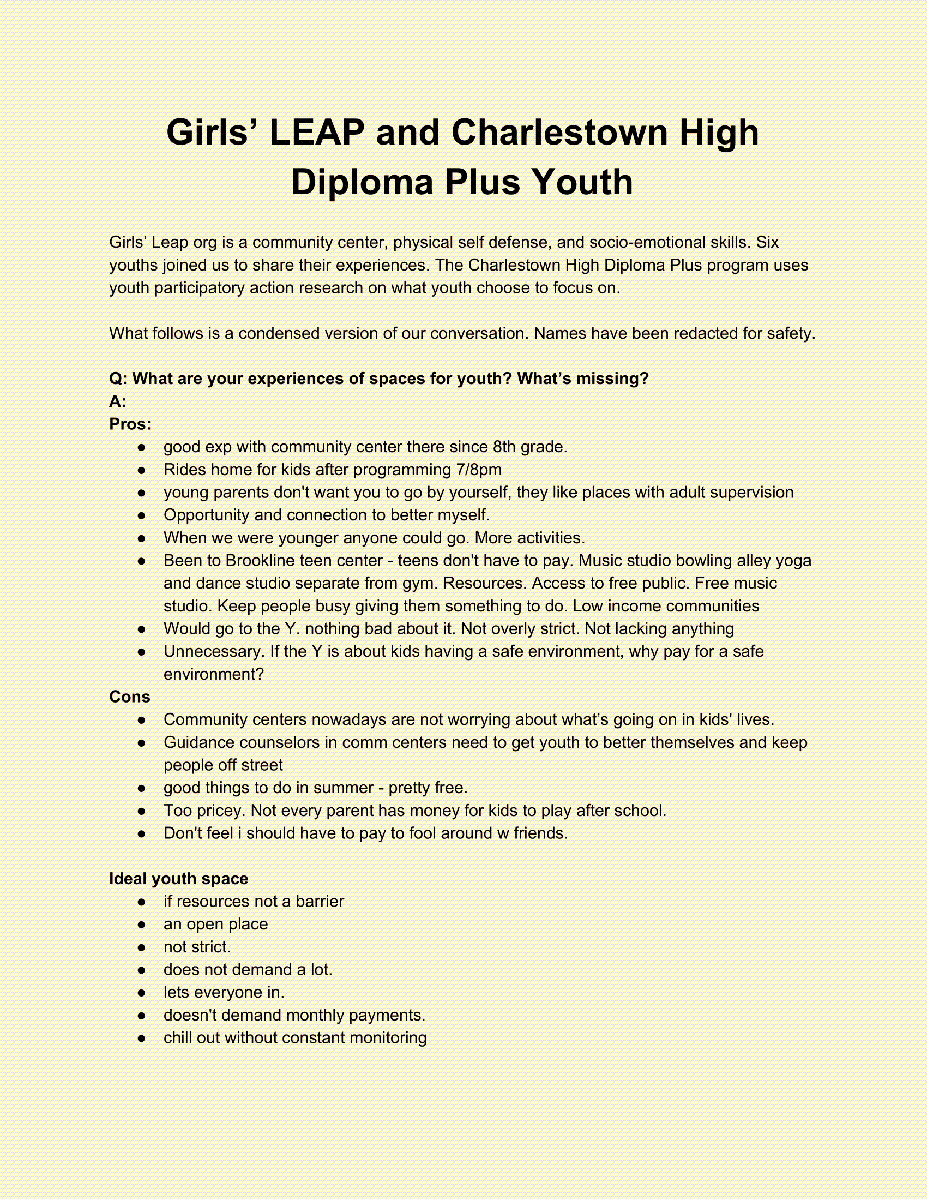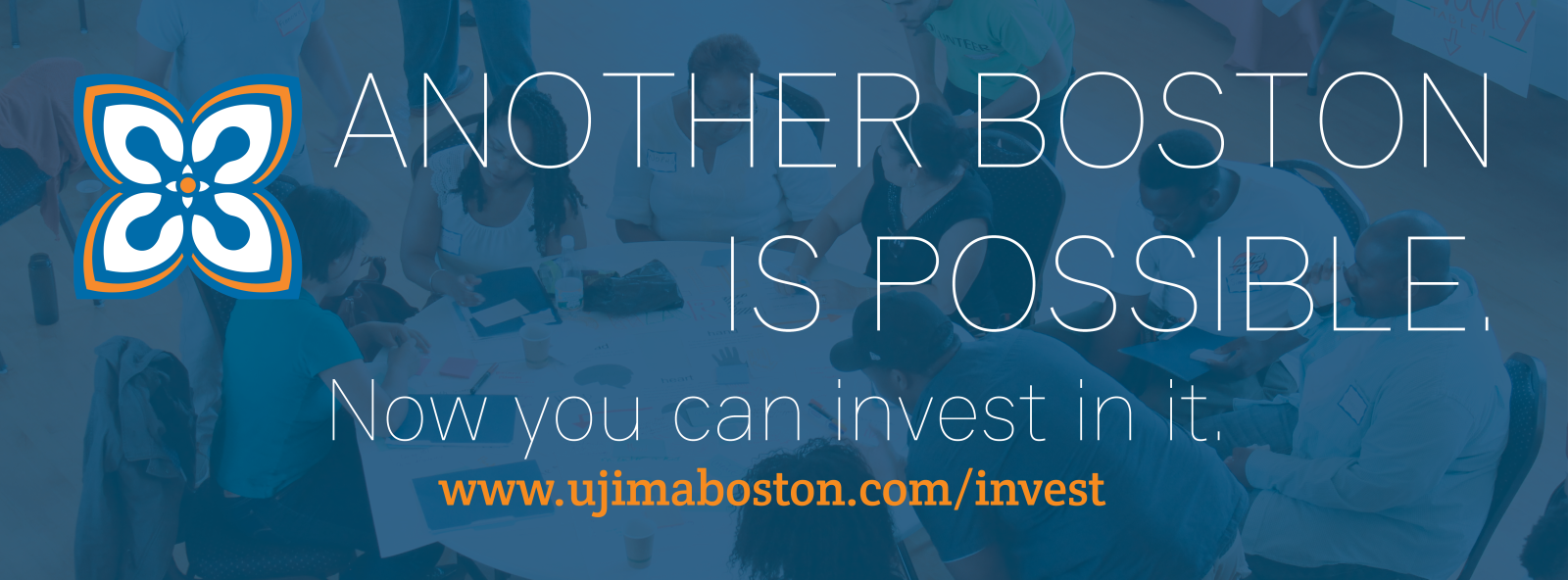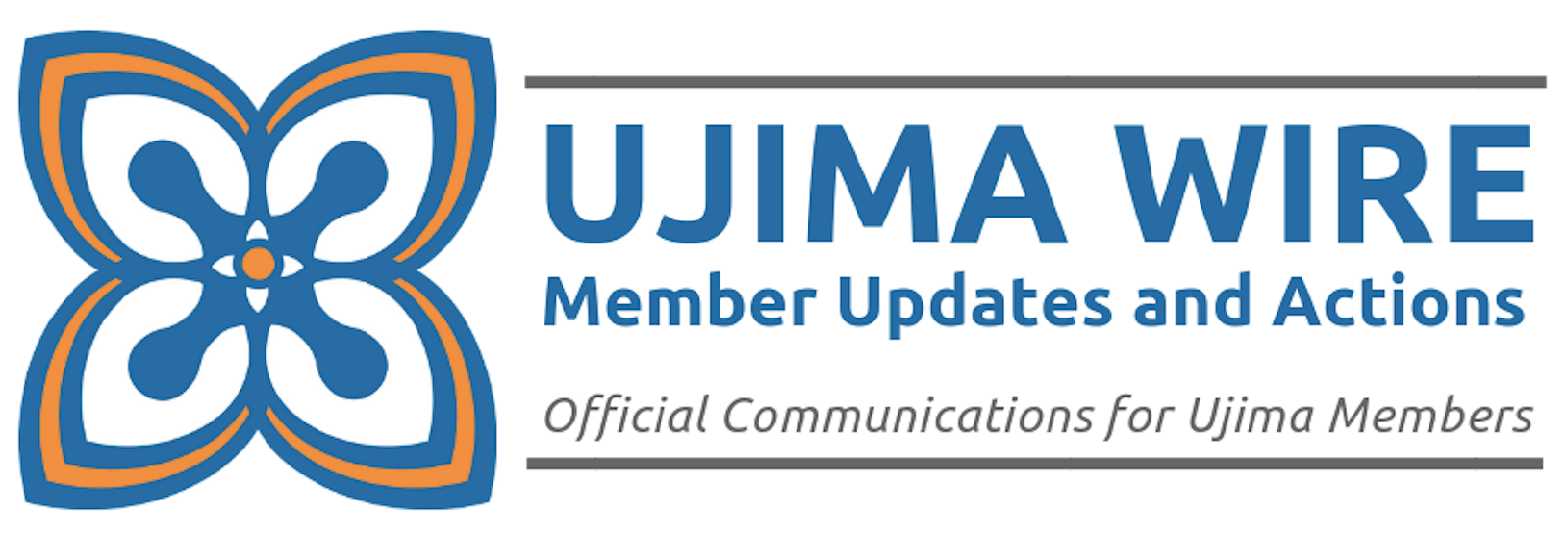
#NecessarySystemEdition
Be #InvestedInUjima | #UjimaWednesdays | #NecessarySystemEdition| Opportunities to Study | Alternative Currency | Ujima Time Bank | How to Invest in Ujima | Appreciations | Neighborhood Econ. Study Group | Ujima is Hiring | Membership Renewal | Jobs | Upcoming Meetings
Be #InvestedInUjima
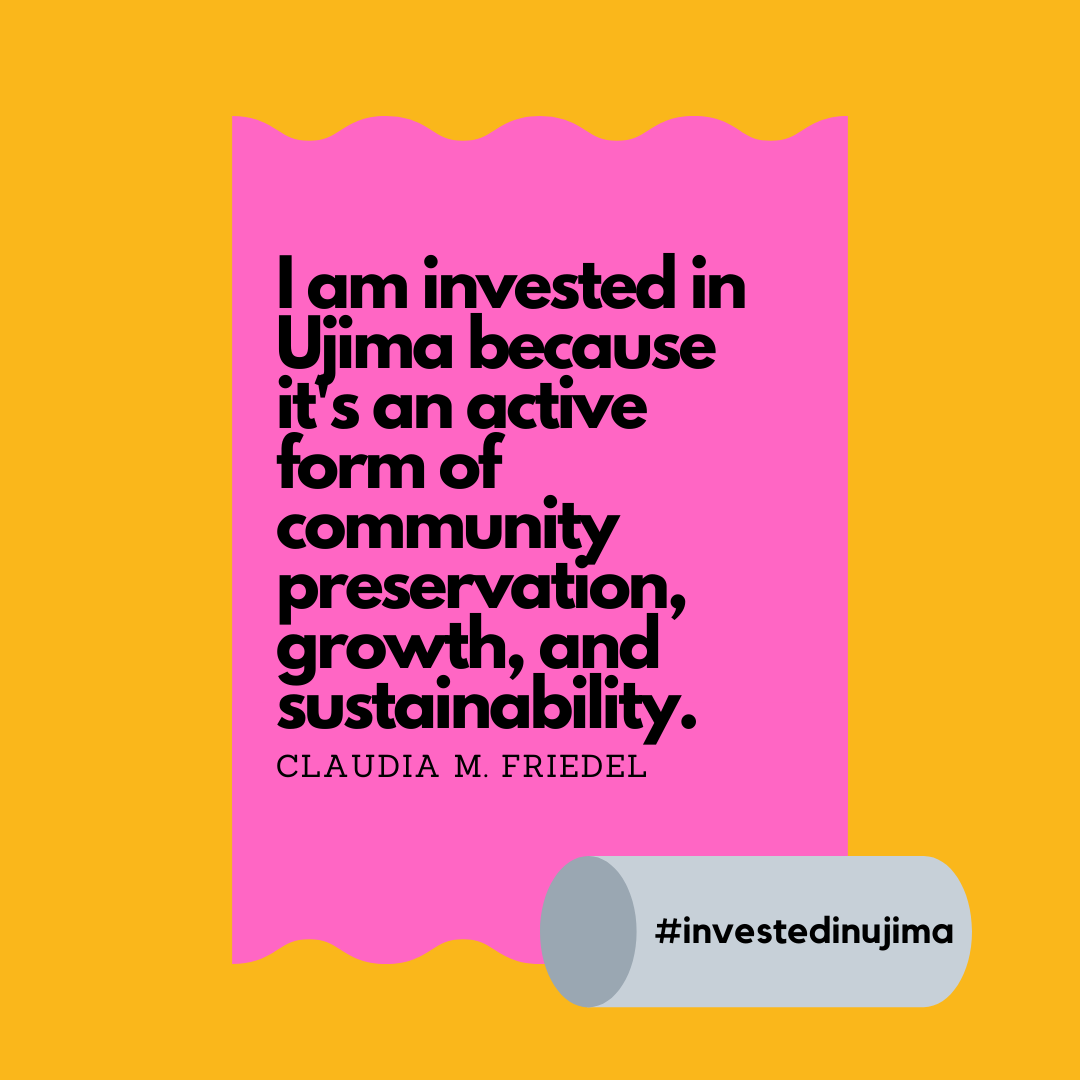
We’ve been asking our investors: Why are you #InvestedInUjima? The responses are life-giving.
Thank you to Claudia M. Friedel for being #InvestedInUjima! Join our community of co-investors.
Get #Invested at www.ujimaboston.com.
TONIGHT 6PM: 'Green Roots Youth'
Our next Ujima Open Meeting is TONIGHT on Zoom – Wednesday, March 18th, from 6:00pm-8:30pm. We're continuing our Neighborhood Needs workshops online via Zoom, exploring the top neighborhood needs chosen by community members at our assemblies, and the theme for March is Youth Space!
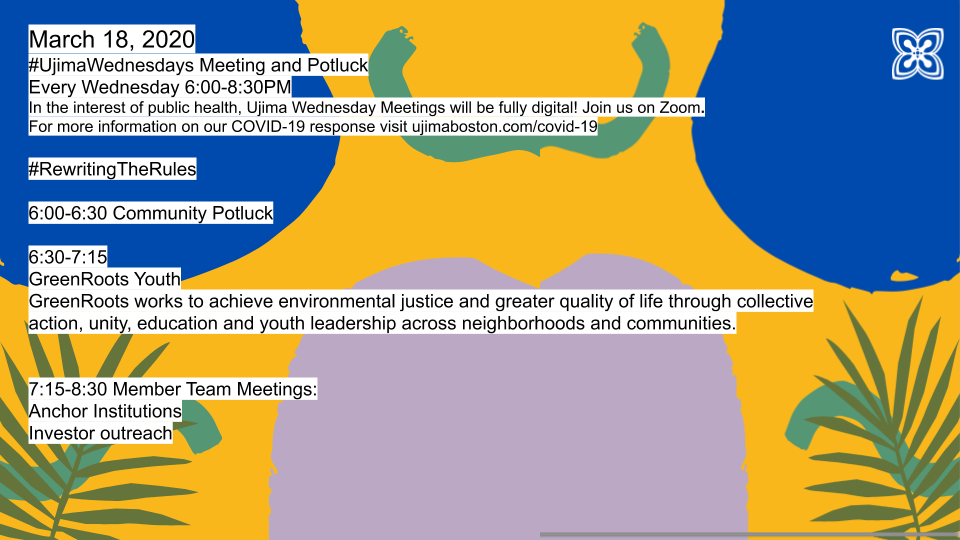
- 6:00-7:15pm #CoLearning: Join Green Roots Youth Mentors, working for environmental justice and improved quality of life for a workshop on Youth Space!
- 7:15-8:30pm #CoCreation: Join the Anchor Institutions or Outreach + Investor Outreach Teams!
PLEASE RSVP. Thank you!
- March 18th Ujima Open Meeting Via Zoom
- March 18th Anchor Institution Team Meeting Via Zoom
- March 18th Outreach Team + Investor Outreach Team Meeting Via Zoom
Time: Wednesday, March 18th, 6PM | Location: ZOOM
COVID-19 Pivot: #UjimaWednesdays Zoom Only Until May 9, 2020
#UjimaWednesdays are always held and recorded online via Zoom in addition to being held in person. We've always provided a Zoom option to accommodate community members who are not able to join us in person for any reason.
Following the guidance and best practices as advised by the CDC, we will hold #UjimaWednesdays completely on Zoom until May 9th, 2020. As this is a fluid situation we will make sure to update you if this changes.
What to know:
The Zoom link for Ujima Wednesday meetings is: tinyurl.com/ujimabostonzoom
This is the link where you register for zoom every time, just make sure you choose the right date!
You can always call into the meeting on your phone:
Phone #: +1-646-876-9923
Participant #: 756970536
Or use the application on your phone if you have a smartphone.
#SocialSpaciousness #StillConnected
#CoLearning Recap: Girls' LEAP & Charlestown High Diploma Plus Program Teens on Youth Space
Last week, we were joined by teen mentors from Girls' LEAP and students of Charlestown High's Diploma Plus program, for a workshop on youth space.
View the full notes with this link and watch the workshop recording here!
#NecessarySystemEdition
January, 29, 2019, Ujima e-mailed out #TheMutualAidEdition of the WIRE and LIST, in response to the Trump-orchested Government Shutdown:
"Early human societies (thousands of years ago.) Post-Hurricane Maria in Puerto Rico (September 2017-today). The Underground Railroad (late 1700s). The Zapatistas Movement in Chiapas, Mexico (1983-today). The 35 Day Federal Government Shutdown (December - January 2019). What do all of these have in common? They all hold examples of human beings practicing mutual aid in the face of dire challenges and danger, when the dominant political or economic system was failing them or was actively causing harm. So what is mutual aid, and why the #MutualAidEdition? Mutual aid: a voluntary reciprocal exchange of resources and services for mutual benefit. Mutual aid, as opposed to charity, does not connote moral superiority of the giver over the receiver. (Source) The Government Shutdown was a powerful demonstration that the system controlled by our president and the elite class directly contradicts the spirit of mutual aid, and is designed to exploit and starve working class people for the benefit of a very tiny number of people. There is nothing mutual about it. The response to this crisis by our communities, however, shows that mutual aid is both natural and necessary for the vast majority of us. . . We know that this shutdown is not an isolated event — it could happen again in two weeks or in two months, and there are so many other ways that we need to continue to support each other."
- Sarah Jacqz
"We know that this shutdown is not an isolated event -- it could happen again in two weeks or in two months, and there are so many other ways that we need to continue to support each other."
It has happened again. Just over a year after #TheMutualAidEdition, the Trump administation's failure to care and act appropriately to contain the Coronavirus epidemic in the U.S., bares multiple systemic holes and shows once again that "mutual aid is both natural and necessary for the vast majority of us."
This does not have to happen again. Social distancing allows us the opportunity to reflect on what was clearly possible before and rethink how our society is ordered, beyond emergency. We can formalize both the values (“voluntary reciprocal exchange of resources and services for mutual benefit”) and the mechanisms (timebanking, participatory budgeting, etc.) of what are natural and necessary for us, to create the system that we not only want, but also the system that we need. The response to today’s crisis - moratoriums on evictions, the extension of paid sick and family leave, and the release of some people from jails - to protect public health, demonstrates the ease with which we can move. Another system is necessary. In this edition, we highlight four areas to rethink to create our #NecessarySystem.
RETHINK ABILITY

Up until this point we have been told that we were unable to do our jobs from home, an unnecessary barrier informed by the false narrative of productivity. Under the current system, our social patterns treat anyone who doesn’t fit the normative frame as excess. This will continue to shape our society and movements unless we center the calls for action coming from those most marginalized.
In What can a body do?, Sara Hendren asks, “What can a body do? It depends, in the most interesting and politically charged ways: It depends not just on the body but on the extended shapes of the world around it in every way. Who gets down the street, into the bus, to the classroom or the voting booth, a shot at the interview?”
The ableist orders in which we live were created by design. They are embedded in the designs of everyday objects, spaces and psycho-social abilities we take for granted. In 2013, Hendren proclaimed, “Scholars and people who are activists for disability rights have spent a lot of energy in the last decades showing that disability is not about the state of a human body; it’s about the built environment, structures, and institutions that make life possible and meaningful—or conversely, impossible and meager—for certain kinds of bodies and minds.”
Disability justice advocates have been calling for the ability to participate in all aspects of civic life, economy and culture, fairly. As we slow down, we are finding new modes of living, thinking, and disrupting our systems to prioritize accessibility, health and belonging for everyone in our society.
RETHINK CULTURE
From live shows to streaming to decompression, culture is the thread that weaves our connectivity. Culture is the evidence of human consciousness. Culture broadens our intellect, gives us space for reflection, provides our escapism. Culture is how we find friends, lovers, “cultural fit” can make or break a career, it’s how we identify common bond--yet cultural work is critically undervalued and is defined by a gig economy. The pandemic brings us to a critical point in how cultural work is systemically valued in a capitalist society. What can we do to ensure that cultural workers have sustainable incomes and careers?
In Marc Hogan‘s 2018 Pitchfork article “How Countries Around the World Fund Music—and Why It Matters” is a deep dive into how other countries provide economic models in the arts and culture sector.
Hogan explores the vast inequities of America's funding amounts and population, concluding, “America, in all this, is like an outlying planet with a powerful gravitational pull. Lacking grant funding, its music industry is inherently market-driven…But in the countries with the strongest reputations for funding the arts, cultural expression, like other basic needs, is considered a universal right, not a privilege for the wealthy.”
These models allow for scalable opportunities and growth to nurture artists and have inherent sustainability rather than the U.S.’s model of chasing payment from organizations and funds that claim artists’ cultural capital as their own.
RETHINK POLICY
Detroit’s decision to restore water to residents who experienced shut-offs because of nonpayment is notable not only because of its proximity to Flint, Michigan, where thoughtless cost cutting measures resulted in a years long water crisis with negative health effects that continue, but also because like the actions noted above, the decision shows Detroit (and other cities) could have done so all along. As the Detroit coalition, People’s Water Board, points out, the city should address the root cause of shutoffs, unaffordable water, so that they do not occur at all.
According to the Food & Water Watch 2018 study, “America’s Secret Water Crisis,” “more than half a million households lost water service for nonpayment, affecting an estimated 1.4 million people in 2016.” Furthermore,”[c]ompared to the cities with the fewest shutoffs, the highest shutoff rates occurred in lower-income cities with higher rates of poverty and unemployment.” and “[o]verall, communities of color had higher water bills.” One of the factors driving higher shutoff rates are local policies: “The three utilities with the highest shutoffs gave residents the least amount of time to pay their bills before facing shutoff. In Springdale, Arkansas, which had the third highest shutoff rate, the minimum time between the date the bill was sent and disconnection of service for nonpayment was a mere three weeks. At the other end of the spectrum Eau Claire, Wisconsin and Leominster, Massachusetts did not use water shutoffs for collection at all.”
Local policies can change. Water is a human right.
Lack of water is a public health concern, pandemic or not.
RETHINK ECONOMY

Under our current economic structure, not everyone can work from home, and this stark reality of mass layoffs hit service workers and freelancers hard. Calls for direct support grew exponentially in the form of online petitions for paid sick time off, while Whole Foods asked employees to “donate” vacation time to support employees without sick time or paid time off. Many service employees were already choosing to work while sick, and are now left without steady income. Unemployment insurance is one benefit, however this is still a barrier for workers who are tips-based.
This recent Politico article, featuring Boston's cooperative ecosystem, cites workers' lack of control over time and work as one reason for the growth of worker owned co-ops. “They want more control over their working lives, more control over their schedules,” [Stacey]Cordeiro says. “They want more control over what clients to serve and how. A lot of times, they want better wages. They’re hoping to make more money, and they do that by keeping the profits from the business.”
Author Erick Turley quotes Jason Ewas who states, “[r]esearch suggests that employee-owned companies, from co-ops to companies with employee stock ownership plans, tend to be more resilient during an economic downturn . . . laying off fewer people and going out of business less often than traditional companies.” With 19 worker co-ops, Greater Boston has the third-largest number of co-ops in the nation, behind only New York and the Bay Area. Turley notes, “[t]he typical worker co-op is 100-percent employee-owned, and its worker-owners have equal voting power, instead of votes weighted by share.”
The values of mutuality, democracy and justice aren’t just statements, they work.
As we continue to forge ahead in these uncertain times, our #NecessarySystem must be rooted in collective care. We know we still have to get through this crisis. Collective care is our best weapon against COVID-19. This document records mutual aid efforts around the world. The Ujima Timebank is another form of mutual aid for us at home. Join us!
Opportunities to Listen
Podcasts are a convenient and interesting way to engage with new ideas. As you navigate social distancing, feel free to listen, share, start a conversation with your friends. This week’s highlights include a black meditation app; a conversation on COVID-19; an opportunity to get to know a member of your community, Eroc as he discusses masculinity; and a conversation on preserving community histories.
- Liberation Meditation App
- How to survive the end of the world - COVID-19 Wisdom from a Social Justice Lens EP
- Top Rank Podcast - On Making History with Professor Maria Cotera EP
- Irresistible Podcast- Tender Masculinity with Eroc Arroyo-Montano EP
- Women at Work - Sisterhood Is Power Part 1
UPDATE on Common Good
Our pilot with Common Good has ended with Dudley Cafe, and they are not currently accepting the card. We will be launching a new pilot with additional establishments later this year and will update this section with updates when we know more. Thank you to everyone who has participated and please reach out with thtoughts or feedback!

Join the Ujima Time Bank!
Speaking of alternative currency... The Ujima Time Bank is another way to save money and create community connections while creating a new economy in Boston!
What is a time bank?
A Timebank is a system of exchange where the unit of value is person-hours. When a member of a timebank performs one hour of service for another member, they are awarded one hour of credit in the Timebank, which can then be redeemed for one hour of service from another member. For example: Samantha can fix Jess’s blinds, and then Jess can teach Freddie Spanish, then Freddie later gives Samantha a ride, and the Timebank keeps track so it’s fair.
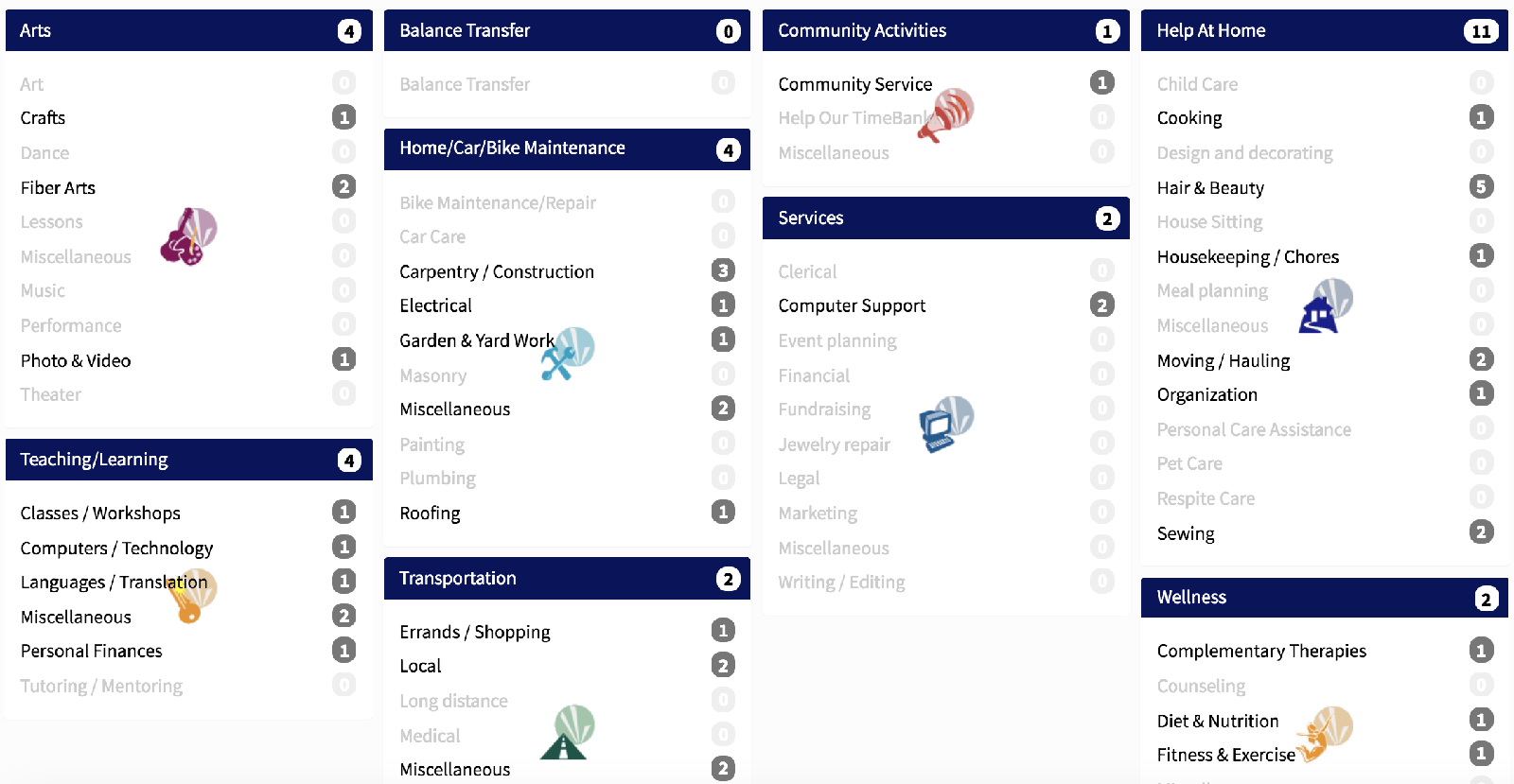
*Featured Offer: "marketing/design" Expires in 5 months
"I love helping small businesses/non profits or even individuals speak clearly graphically."
*Featured Request: "Seek Help for Gmail Problem" Expires in 5 months
"I have a problem with sending emails from my Gmail account using different addresses. It has worked previously. If you can help or know someone who can, please contact me asap. Thanks."
Join the time bank to respond and see more! Anyone who lives in Boston can join the Time Bank at www.ujimaboston.com/
How to Become a Co-Investor in the Ujima Fund
- Read Ujima's Offering Memorandum. This document describes the risks, regulations, and background of the fund. The Offering Memorandum should be read in it's entirety, with careful attention to the Risk Factors (page 11), Description of Notes (39), and Subordination Agreement (77).
- Consult the personal finance worksheet if you are unsure of how much to invest.
- Invest online (multiple payment options available):
- Choose the option next to the type of investment you are making.
- Complete and sign all forms via Docusign (Investment Agreement, W-9, and Demographic Information).
- After submitting, select your payment option. (You will see instructions on how to send a check if that is your preferred payment.)
- OR: Invest via mail:
- Choose the option next to the type of investment you are making.
- Select the print option on Docusign.
- Complete and sign all forms manually (Investment Agreement, W-9, and Demographic Information).
- Write a check, payable to the Fund, for the amount you wish to invest in the applicable Notes.
- Send the Investment Agreement and your check to the Fund [PO BOX 180310 Boston MA 02118].
- Email invest@ujimaboston.com
or call 617-446-3863 with any questions
Please contact invest@ujimaboston.com
#UjimAppreciations
Thank you to...
- All of our new members who have joined Ujima!
- Anton
- Jordan
- Rachel
- Alan
- All of the members who have renewed their Ujima memberships!
- Lina
- Everyone who made last week's #UjimaWednesdays event such a success!
- Girls' LEAP Youth Mentors
- Charlestown High Diploma Plus Teens
- The following for inviting Ujima to share its model! #COVID-19Pivot
- Harvard Social Enterprise Conference 2020
- 2020 health Equity and Leadership Conference
- 16th Annual Black Policy Conference at Harvard
To Peers, Partners, and Community Members who are doing their part to keep us informed, informed, safe, and loved during this time.
Ujima Neighborhood Economics Study Group
We are excited that the Ujima Neighborhood Economics Study Group is underway, continuing to explore the feasibility of projects that address our community-wide needs. The group meets every 3 weeks, and the next meeting is March 25th. This study group is co-coordinated by Ujima members and staff. Some participants will focus on a specific area of study and some writ-large. The group will build on the learnings from the exploration that Ujima members have already done, and will carry this research forward to get even closer to implementation and investment in projects that meet our needs.
The topics include:
- Community Land Trust
- Community Owned Internet
- Community Owned Energy
- Urban Farming
- Creative Economic Placemaking (Black Market)
- Community Space
- Arts/Cultural Organizing Space
- Childcare
There is also space for members to coordinate study groups on additional topics of interest. Please email pampi@ujimaboston.com if you are interested in getting involved or want more information!
Internship Opportunities
We need your help to find great interns to grow our team. Ujima is offering these internship opportunities on an ongoing basis. Please share widely!
To apply, email nia@ujimaboston.com to express interest and get further information.
Ujima Membership Renewal
Renew your Ujima Membership today. We need dedicated members to build a just future, and we’re asking you to join us again for year two. Our goal is to reach 95% member renewals, while growing our overall membership to 600. Help spread the word about our network and activities!
Jobs in the Ujima Network
- Multiple Positions, Scholars Strategy Network
- Program Coordinator, MassArt
- Education & Advocacy Coordinator, Eyewitness Palestine
- Front of House, Tanam
- Research Contract Position, Transform Finance
- Human Resource Recruiter, Care Manageemnt Temporary Staffing
- Senior Program Officer - Economic Opportunity, LISC Boston
- Program Specialist, Girls Inc. of Lynn
- Relationships Manager, Resilient Coders
- Director of Philanthropy, Learning and Evaluation (Director), Episcopal City Mission
- Multiple Positions, Democracy Collaborative
- Loan + Outreach Officer and Bookkeeper/ Administrative Coordinator, Cooperative Fund of New England
- Multiple Positions, Better Future Project
- Multiple Positions, Participatory Budgeting Project
- Multiple Positions, CERO Cooperative, Inc.
- Democracy Interns, Small Planet Institute
- Multiple Positions, All In Energy
Upcoming Ujima Meetings
We hold Open Meetings every Wednesday at 6pm, on ZOOM! Check out our March Calendar below!
#UjimaWednesdays are always held and recorded online via Zoom in addition to being held in person. We've always provided a Zoom option to accommodate community members who are not able to join us in person for any reason.
Following the guidance and best practices as advised by the CDC, we will hold #UjimaWednesdays completely on Zoom until May 9th, 2020. As this is a fluid situation we will make sure to update you if this changes.
The Zoom link for Ujima Wednesday meetings is: tinyurl.com/ujimabostonzoom
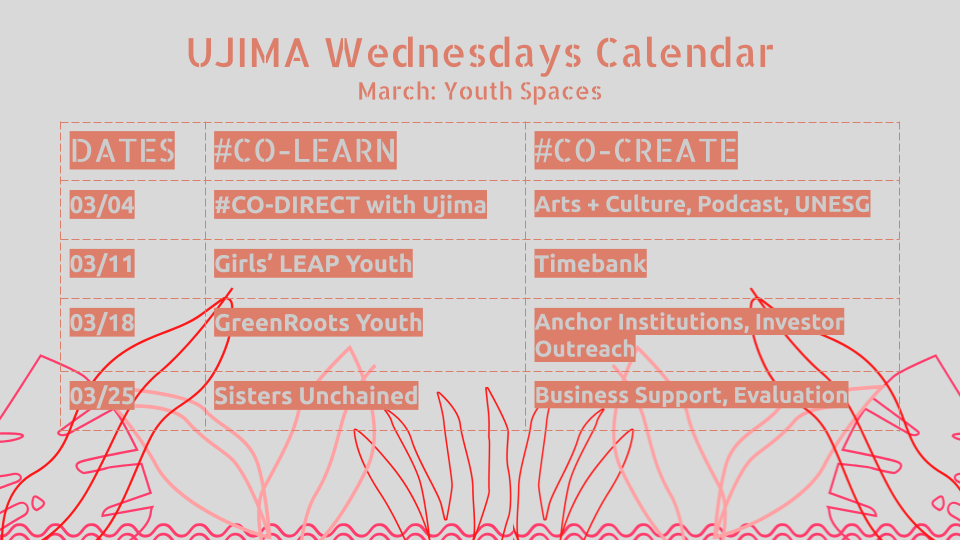
6:00-7:15 - Community Building + Financial and Political Education.
7:15-8:30 - Member Team Meetings (Based on rotating schedule; See calendar above)
